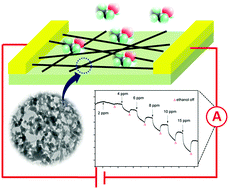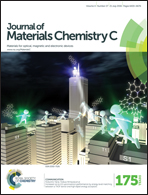Single-walled carbon nanotubes templated CuO networks for gas sensing†
Abstract
The design and synthesis of materials that can be used for sensing gases and vapors at ambient temperature is of much significance to environmental monitoring, public health and safety. Herein, single-walled carbon nanotubes (SWCNTs) templated CuO networks (SWCNT/CuO) were synthesized via a facile sol–gel method. Raman and XPS characterization proved that CuO was covalently linked to SWCNTs via Cu–O–C bonds. After deposition of the obtained SWCNT/CuO onto the interdigitated gold electrodes to assemble gas sensors, both ethanol and water vapors were successfully detected by the sensors at ambient temperature. Electron donation from both analytes to the p-type sensing material results in a conductance decrease effect on the SWCNT/CuO sensor. The ambient operating temperature overcomes the high operating temperature shortcoming of most reported CuO-based sensors. Meanwhile, the high sensitivity (2 ppm for ethanol) indicates promising sensing applications for the as-prepared SWCNT/CuO material described in this study.


 Please wait while we load your content...
Please wait while we load your content...